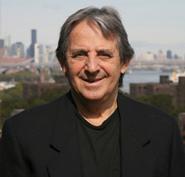
Norman Steinberg made his first venture to Hamilton College on Nov. 19, where he presented on “The Life of a Writer” as a guest of the Career Center. An Emmy Award winner and recipient of the Writer’s Guild Award, Steinberg came to Hamilton “not to sell a program, but to sell a life.”
He drew a wide audience, who received their first taste of showbiz when Steinberg showed up fashionably late, and kept them engaged with his larger-than-life personality and theatrical animations. He focused on aspects of his one-of-a-kind pre-professional, writing intensive program, The TV Writers Studio, to explore the multifaceted career of screenwriting.
After graduating the University of Pittsburgh School of Law, Steinberg realized he would never be happy practicing and decided to turn his eye toward writing. After being introduced to the business by Mel Brooks, his personal idol, Steinberg broke through into screenwriting and later worked with Brooks on Blazing Saddles. His other projects in cinema include My Favorite Year, and Johnny Dangerously; although he is also quite prolific in television, working on a variety of programs including “Cosby” and “Doctor, Doctor.” A renaissance man, Steinberg has held positions as a writer, creator, showrunner and executive producer. Drawing on these experiences, his two-year program aims to produce capable, well-rounded professionals, with a strong portfolio, who are ready for a career in television.
The TV Writers Studio only accepts between 20 and 25 applicants each year and deals with a range of topics from digital media, to screen writing, to casting, to editing, and even costume design. The group meets in Brooklyn one day a week to collaborate for 12-14 hours, writing a pilot script for a one-hour television drama; individuals also produce a pilot screenplay for a web series marketed to YouTube. The program focuses on collaboration and mimics the schedule of the day-to-day writing staff of a TV series. “No one can teach you how to write” he posits, “but they can teach you how to be a writer.” The program focuses on careers in television, but Steinberg points out that the skills are transferable. In the current market, television is where the jobs are. With expanding opportunities like Hulu, Netflix and YouTube series, demand for talented writers is high.
When Steinberg was given the opportunity to thank Brooks for helping him into the business he asked what he could do to repay the renowned director. Brooks’ response has stuck with Steinberg through the years and would eventually lead him to the form the TV Writers Studio. His answer was simply: pass it on. Taking this to heart, Steinberg has worked to help aspiring writers, celebrating the inaugural graduation of the first class of the TV Writers Studio in 2012.
Posted November 20, 2013
